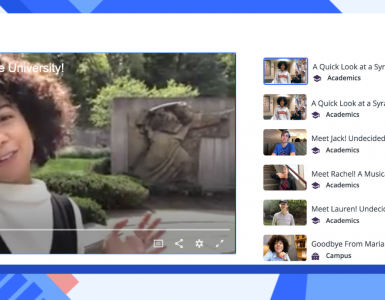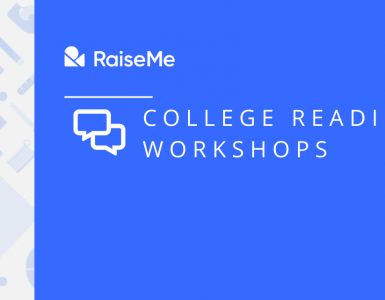Six Time Management Tips For High Schoolers: Make 2018 Your Best Year Yet
New Years provides a natural opportunity to reflect on the year past– the highs, the lows, and the factors that contributed to each. In generating that list, patterns tend to emerge that help to identify the behaviors we can carry over into the new year that make us our healthiest, happiest selves. This is true at every stage in life and can be especially prudent in your high school years as you start to plan your post-secondary future. College-readiness, after all, is not a destination, so much as a path you pave with your intentions. It’s the day-to-day choices, the small commitments you make to yourself, that get you to and through college. So, in the spirit of New Years Resolutions, we’ve compiled a list of daily study habits that will set you up for success in 2018. Forming these habits now will not only boost your learning in high school, but give you the leg up in college.

1. Don’t multitask. Put away phones/social media when studying.
Neuroscience, or the study of the brain, has revealed many interesting facts about the way we learn. Think you’re naturally skilled at multitasking? Well, research published in the Harvard Business Review confirms that, when it comes to attention, our brains are incapable of focusing on more than one thing at a time. In fact, a person who faces interruptions during a task takes 50% longer to accomplish that task and makes up to 50% more errors. Secondly, our attention span as humans is about 10 minutes at a time of concentrated effort. Trying to cram more in does not allow the requisite time for the brain to digest new information.
How can you use these facts when studying?
- Do one thing at a time and create a distraction-free zone. Close the tabs on your computer and set your phone aside so it’s not in your vicinity when you’re studying.
- Take breaks. Focus on a task for 25-30 min, then give yourself a 5 min break to let your brain process before proceeding.

2. Match your study environment to the learning environment to lock new concepts in to memory.
Neuroscience has proven that we remember best when the studying conditions closely match the original learning environment. This is because, the more similar the context, the easier it is for your brain to recall information.
How can you use this fact when studying?
- For homework, try to have your space and materials match the original classroom as best you can.
- For presentations, do a “dress rehearsal” – practice what you’ll present, and how you’ll set up, in an environment that mirrors the classroom.
- For exams, do practice tests under the same conditions you’ll face on the day. If it’s timed, practice this. Multiple choice, free response, essay? Do a dry run of each format– it’ll help your brain jump in to action when you need it to perform.
3. To retain new information, make a real-world connection.
Your brain is being presented with countless stimuli throughout the day. To determine what’s important, we pay attention if the stimulus elicits a strong emotional response. Therefore, the more personally meaningful or emotional a new learning, the more likely you are to lock it in to memory.
How can you use this fact when studying?
- For new information you are reading, annotate the text with connections you can make from your own experiences. Find a real-world example that relates.
- For vocabulary and foreign language, try writing sentences that use new words or concepts in ways that are meaningful to you.
- For math, try making a tune, rhyme, or catchy association for remembering a new concept.
- Across all subjects, try putting a new concept or idea in to your own words. Teach a family member the idea you’re trying to retain.
4. Don’t cram. Plan ahead and calendar out your study plans for exams.
There’s a finite amount of space in our brains for information. Furthermore, what we can readily remember depends on how much time we’ve spent mulling it over. Research shows that if we don’t repeat information, it disappears from working memory. In order to recall information on quizzes, exams, or papers, we need to regularly revisit the ideas.
How can you use this fact when studying?
- Do not cram. Last minute studying will not stick in your memory.
- Plan ahead and calendar your studying. You know when a test is coming. Give yourself a few weeks in advance to revisit information briefly each night.
- Repeat material in cycles. For example, if you have multiple exams coming up try studying two subjects per night for 30 minutes each. Monday: Math and History; Tuesday: English and Science. The more routine you can build in to your studying, the easier it will be for your brain to dive back into the material.
5. Get serious about sleep
Research confirms that sleep loss hurts your ability to think in every measurable way.
Sleep loss hurts:
- Attention: you won’t be able to focus at school after a night of little sleep.
- Working memory: learning and new skills get solidified in your brain after a good night’s sleep. If you didn’t sleep, you won’t retain that information.
- Mood: the less sleep you get the worse your ability to regulate your emotions.
- Quantitative skills: problem solving ability requires good sleep.
- Logical reasoning ability: making sound judgments, both in school and life, requires sleep.
- General math knowledge: your ability to recall math information takes a hit when you’re low on sleep.
On the positive, a healthy night’s sleep can boost learning significantly. How much sleep we need is highly dependent upon our individual biologies. On average, a good rule of thumb is 6-8 hours per night.
Tips for getting a good night sleep:
- The darker your room, the better you sleep.
- If possible, set your room temperature to around 68 degrees F.
- Reserve your bed for sleep only. Avoid doing school work or leisure activities in bed.
- Screens are stimulating and keep you awake. Avoid using your phone or computer in bed, as screen time makes it more difficult to fall asleep.
- Set a cut-off time for caffeine intake. Refrain from drinking coffee or tea at least 4 hours before bed.
- Establish a bedtime routine. The more consistent you are with time to bed and wake up time, the more benefit you’ll get from sleep.
6. Move your body every day, 30 minutes a day.
Studies show that exercise improves long-term memory, reasoning, attention, and problem solving. It turns out that even if you do as little as walk several times a week, your brain will benefit. A great goal would be to get 30 minutes of aerobic exercise (jogging, biking, swimming, etc.) for two to three times a week.
How can you incorporate this fact in to your study habits?
- When taking breaks between homework tasks, consider going for a short walk as well as doing bodyweight strength exercises (push ups, sit ups, squats)
- Consider joining a sports team or exercise club! Not only is this good for your brain health and academic performance, many colleges look for candidates who have participated on sports teams. Check out what colleges are offering micro-scholarships for participating in sports on your RaiseMe portfolio right here
To recap, the following habits will help you make 2018 your most productive year yet:
- No multitasking. Put away phones/social media when studying.
- Match your study/homework environment to the learning environment.
- Make a real-world connection to your study material.
- Don’t cram. Revisit core concepts regularly by scheduling your study plans in advance.
- Get serious about sleep.
- Move your body every day.
These are habits that will prove invaluable when you get to college. By committing them to daily practice now you’ll be setting yourself up for success for years to come.
Thea Lee is on the District Partnerships team at RaiseMe. Prior, Thea taught at KIPP Central City in New Orleans. In her free time, she enjoys getting outdoors, going to the movies, and reading about public education in the U.S.
Like this post? Click here to share it with your peers! Want to contribute to the RaiseMe Student Community? Email us at community@raise.me.
You may also like

NEW: Peer Into College Life With CampusReel Videos on RaiseMe
Now on RaiseMe, you can watch videos created by real students to get a true sense of college life and find out what schools are right for you.

Introducing RaiseMe’s College Readiness Workshops: A Virtual Series for Students and Parents
Interact directly with colleges in our new series designed to help you feel supported in your college search journey this fall,...

Join RaiseMe’s Virtual Transfer Fairs: September 2020
During RaiseMe’s Virtual Transfer Fair, community college students can earn micro-scholarships for visiting with colleges, right from home. Students: we know it has...

